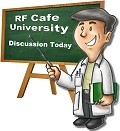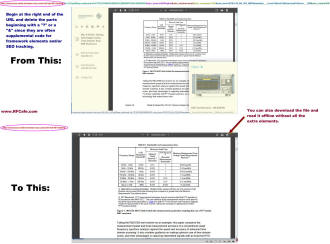How to Remove Clutter from Online Document Displays
|
|
1 | 2 | 3 | 4 | 5 | 6 | 7 | 8 | 9 | 10 | 11 | 12 | 13 | 14 | 15 | 16 | 17 | 18 | 19 | 20 | 21 | 22 | 23 | 24 | 25 | 26 | 27 | 28 | 29 | 30 | 31 | 32 | 33 | 34 | 35 | 36 | 37
If you are annoyed by pop-ups and extraneous framework elements and/or SEO (search engine optimization) tracking code accompanying online application notes, white papers, and images, and videos, many times you can get rid of them by editing the URL displayed in your browser address bar. Compare the displays in this set of screen captures based on the original URL provided in an e-mail (top) to the one where all the extraneous terms have been removed from the URL (bottom). Note that the yellow highlighted components have been eliminated. Often, I remove that stuff from hyperlink URLs before sending my visitors to websites. Companies don't particularly like me doing that, but doing so helps maintain your privacy. URLs in e-mails are particularly likely to contain appended code that contains one or more "&utm_" parts. UTM is the Urchin Tracking Module introduced by Google Analytics' predecessor Urchin and are now supported by Google Analytics. They typically do not add any additional elements to the displayed document or webpage, but can cause a page or document to take a bit longer to load. RF Cafe visitors are busy people and need quickly loading pages, so I do what I can to accommodate them. To strip a URL to its bare minimum, begin at the right end of the URL and delete the parts beginning with a "?" or an "&" and watch for things to disappear without the entire page getting a server error. Chances are you can strip out all the "&utm_" parts in one fell swoop. "?" parts are typically server directives to perform certain tasks. You might want to do this before forwarding URLs to someone else. As with the URL garbage code, through a lot of research and experimentation over the years, I have managed to figure out ways around many things that bug or offend me. For instance, you might have noticed if you use an ad blocker, that my paying advertisers' banner ads almost always appear even with the ad blocker turned on. It is so both here on RFCafe.com and on my hobby website AirplanesAndRockets.com. My livelihood depends entirely on private advertisers who pay good money for an opportunity to present their goods and services to people like you who might benefit from them. I have refused many offers for advertising over the years because the subject was irrelevant. I thought about publishing my method for evading ad blockers, but then the ad blocker companies might read it and include code to thwart my efforts. Another thing is adding the "rel=noopener", "rel=nofollow", and "rel=sponsored" attributes to HTML hyperlink code. Their purpose is to prevent search engine AI (artificial intelligence) algorithms from penalizing your ranking because you link to offsite web pages even if legitimate. A website like RF Cafe could be considered to be just part of a link farm, which is taboo in the SEO world. Not all offsite links are bad, of course, and using them has no effect - good or bad - on the linked-to websites. The downside to using them is that the linked-to website receives no information regarding your website having been the one that provided the incoming traffic, so you get no credit if that website collects statistics on where visitors come from. The "rel=noopener" attribute is used to prevent malicious code from exploiting the target="blank" directive that can hijack the URL. Danger lurks everywhere in the Internet. Here is Google's word on "rel=" attributes. All this adds significant time to publishing a website, but it is a part of the necessary routine for remaining relevant. Twenty years ago when RF Cafe was created, there were no penalties for using bogus methods of generating traffic for your website. I remember when the "spoofing" first started to be discussed that one of the examples being used was inserting the names of then-popular women like Brittney Spears and Pamela Anderson into the "keywords," "description," and "title" meta tags in the <head> section of the HTML code. I, of course, never stooped to that level. Really, I didn't. Search engines don't even use your declared subject anymore, but instead look at the content of the entire page to determine how to classify it.
Posted December 20, 2019 |
 "
"